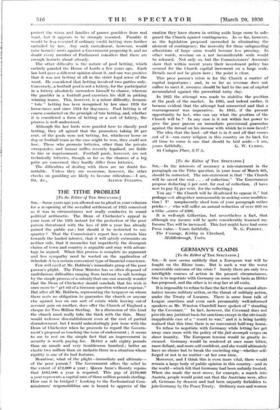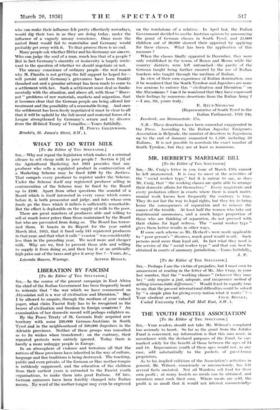GERMANY'S CLAIMS
[To the Editor of THE SPECTATOR.] SIR,—It now seems unlikely that a European war will be fought on the Rhine • issue. But is such a war the worst conceivable outcome of the crisis ? Surely there are only two intelligible courses of action in the present circumstances. One is to negotiate with Germany on some such basis as Hitler has proposed, and the other is to stop her at all costs.
It is impossible to refuse to face the fact that the second alter- native means military action, or the threat of military action, under the Treaty of Locarno. There is some loose talk of League sanctions and even such presumably well-informed speakers as Mr. Winston Churchill have spoken of " standing by the Covenant." In fact, however, the Covenant- does not provide any juridical basis for sanctions except in the obviously inapplicable case of a " resort to war," and it is being tardily realised that this time there is no convenient half-way house.
To refuse to negotiate with Germany while letting her get away once mere with the policy of the fait accompli verges on sheer insanity. The European tension would be greatly in- creased. Germany would, be rendered at once more bitter, more defiant, and more self-confident, and she would ultimately have no choice but to break the encircling ring—whether self- forged or not is no matter—at her own time.
Moreover, and I think this is even more vital, there would remain a large body of public opinion in this country—and in the world—which felt that Germany had been unfairly treated. When she made the next move, for example, a march into Austria, people would point out that the Austrians were, after all, Germans by descent and had been unjustly forbidden to join Germany by the Peace Treaty. Ordinary men and women
who can make their influence felt pretty effectively nowadays, would dig their toes in as they are doing today, under the Influence of a vaguely uneasy conscience. Once more the united front would fail to materialise and Germany would probably get away with it. To that process there is no end. ' Many people ask whether Hitler and his Germany are sincere. Who can judge the soul of a man, much less that of a people ? But in fact Germany's sincerity or insincerity is largely irrele- tant to the. question of whether we should negotiate or not.
The uneasy conscience of ordinary people—the real reason why M. Flandin is not getting the full support he hoped for— will persist until Germany's grievances have been frankly thrashed out and a genuine attempt has been'made to come to a settlement withher. Such a settlement must deal so funda- mentally with the situation, and above all, with those " Have- not " problems of raw materials, markets and migration, that it becomes clear that the German people are being offered fair treatment and the possibility of a reasonable living. And once the settlement has been freely negotiated it must be clear to all that it will be upheld by the full moral and material forces of a League strengthened by Germany's return and by divorce from the-ill-fated Treaty of Versailles.—Yours faithfully, H. POWYS GREENWOOD.
• Brooks's, St. James's Street, S.W. 1.



































































 Previous page
Previous page